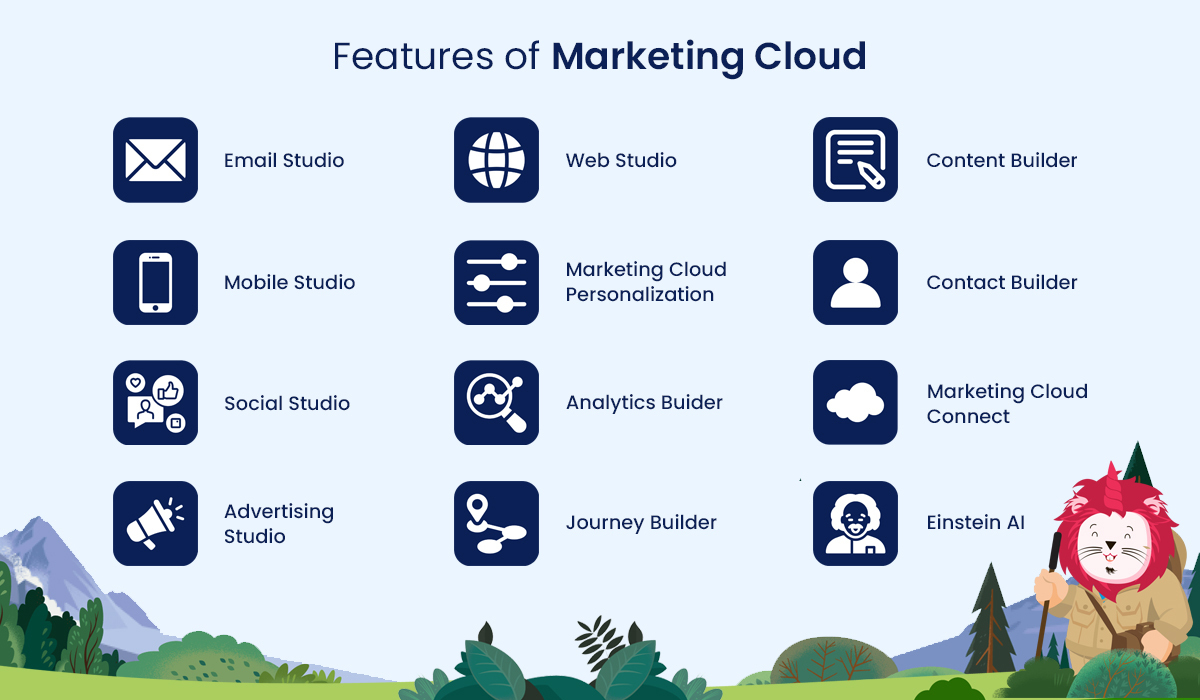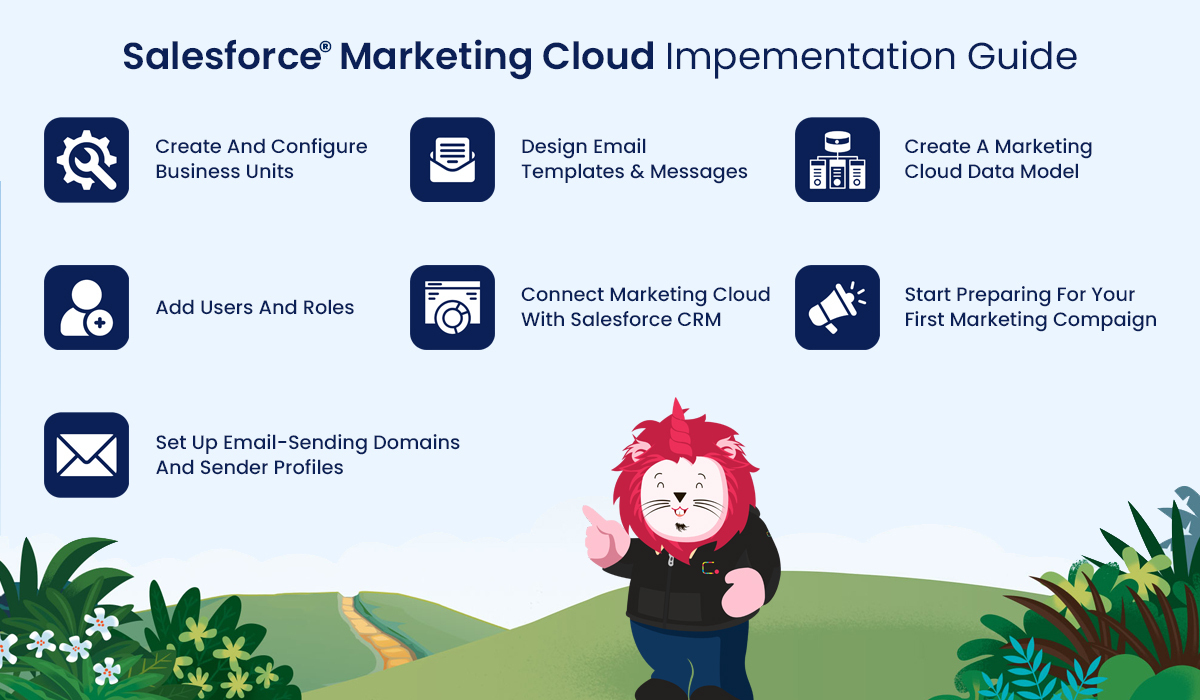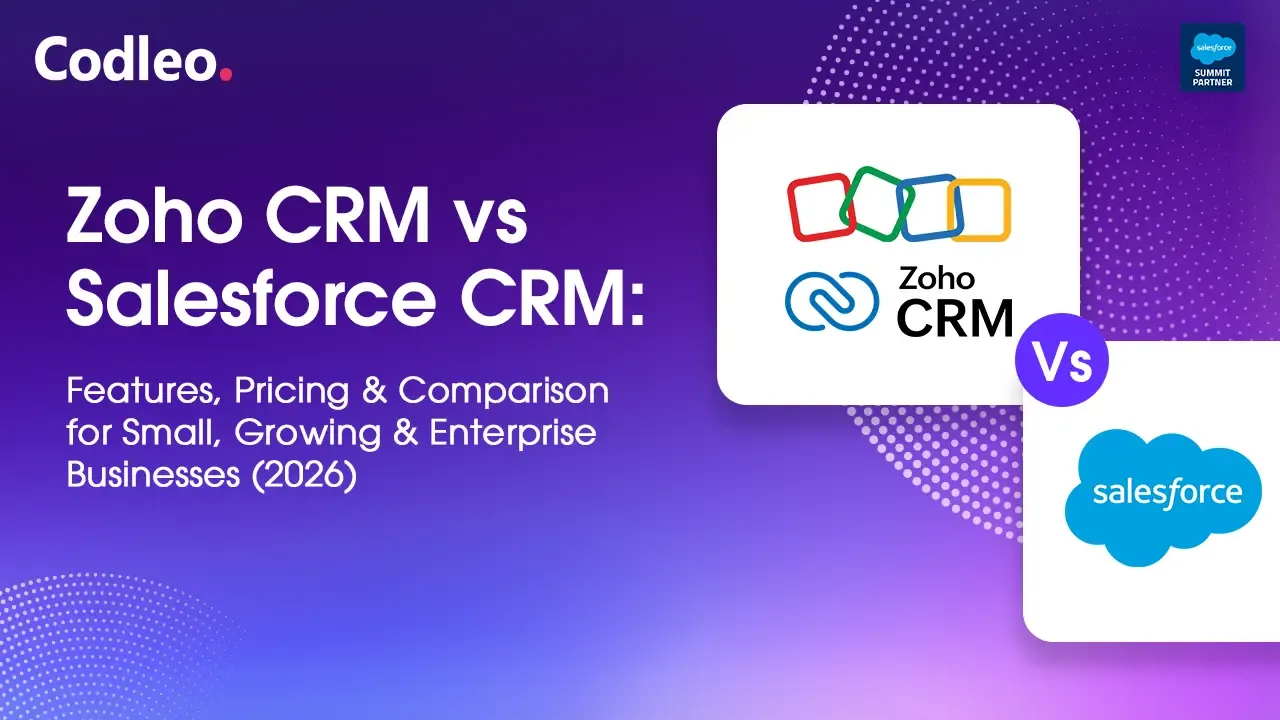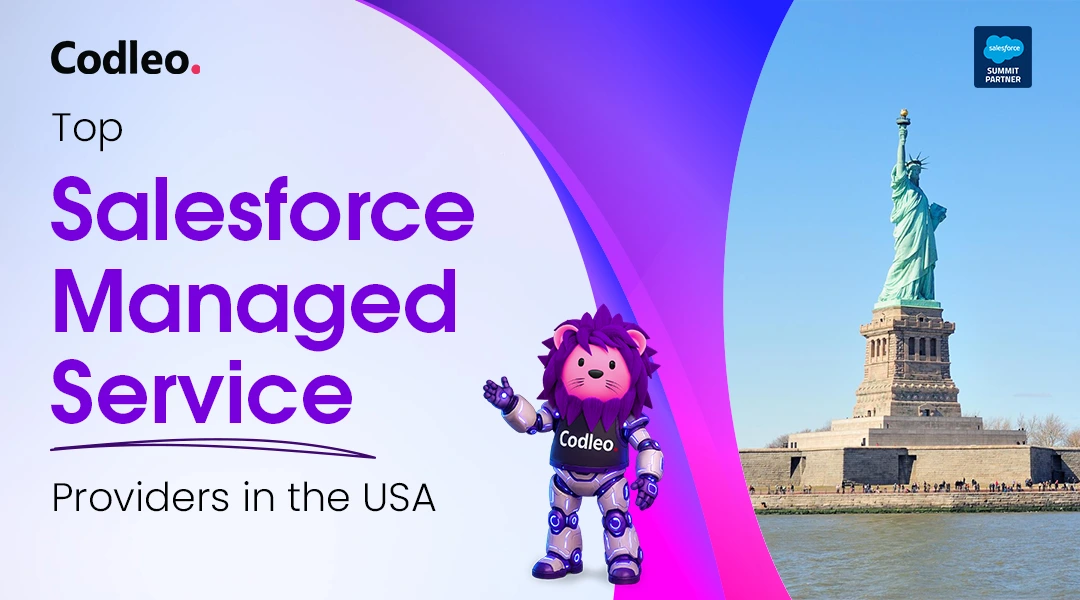Publish date:
Thanks to innovations in marketing tools, robotics, artificial intelligence, and the Internet of Things (IoT), marketing is undergoing a significant transformation. These advancements are enhancing the overall customer experience that businesses can offer. Recognizing this shift, Salesforce acquired ExactTarget in 2014 and later introduced it as Salesforce Marketing Cloud, providing a comprehensive marketing solution for businesses of all sizes.
Intelligent marketing extends beyond just strategies and tactics; it encompasses customer success. Businesses need a platform with multi-channel capabilities to ensure seamless customer engagement throughout their journey.
Salesforce Marketing Cloud is designed for seamless integration with other Salesforce products, such as Sales Cloud, Service Cloud, and Commerce Cloud, facilitating smoother management of CRM data.
This Salesforce Marketing Cloud Implementation guide will help you harness numerous benefits for your business by leveraging the features of SFMC.
What is Salesforce Marketing Cloud?

Salesforce Marketing Cloud, formerly known as ExactTarget, offers a wide range of marketing tools designed to deliver an exceptional customer experience at every interaction point.
This dynamic cloud platform is regarded as one of the most powerful marketing solutions, unifying all marketing channels in one place. By integrating various data sources and devices, marketers can engage in data-driven marketing, minimizing the need for human intervention in crafting personalized content for each customer.
Key capabilities include:
-
Creating a comprehensive view of customer data by integrating multiple data sources, channels, and devices.
-
Ensuring every interaction is meaningful and synchronized using Einstein’s data and artificial intelligence.
-
Facilitating real-time personalized engagement tailored to customer preferences enables two-way communication between marketers and customers.
-
Measuring, enhancing, and analyzing the effectiveness of marketing efforts and fostering customer loyalty.
Salesforce Marketing Cloud Features
Salesforce Marketing Cloud is equipped with numerous features that enhance current digital marketing efforts:

1. Email Studio
Email Studio is a robust tool designed to enhance email marketing efforts. It allows teams to achieve success through personalized one-to-one messaging with their audience, facilitating the execution of effective email marketing campaigns. Its drag-and-drop segmentation feature enables companies to quickly filter prospect profiles. With Email Studio, sending personalized emails to potential customers becomes seamless, aiding in converting leads into buyers. Additionally, the tool tracks email details, helping marketers take the next best action based on engagement data.
2. Mobile Studio
Mobile Studio enables the creation of mobile-specific content, including SMS, MMS, and push notifications. It allows businesses to send information to customers when they are near a store and use Group Connect to send messages via apps like Facebook Messenger and Line Mobile Messaging App. Mobile Connect supports the creation, sending, receiving, and tracking of SMS and MMS messages, ensuring timely and effective communication with customers.
3. Social Studio
Social Studio provides a complete social media management solution, allowing users to manage, schedule, create, and monitor posts from a single platform. Its unified interface makes it easy to organize posts by brand, region, or team. Real-time publishing and engagement features make it an essential tool for content marketers. The platform also offers comprehensive analytics on content performance by social network and time frame, enabling users to stay on top of trends and recommend new content ideas. Social Studio's customizable team-based collaboration features enhance teamwork and streamline social media management tasks.
4. Advertising Studio
Advertising Studio offers a comprehensive solution for managing advertising campaigns across multiple channels, including social media, mobile, sales, and customer service. It helps businesses enhance their email marketing goals and engage with existing customers while reaching new prospects. Key features include activating CRM data for targeted campaigns, creating integrated campaigns with Journey Builder, and connecting leads in real-time with Lead Capture. Advertising Studio provides powerful tools for effectively managing advertising efforts and maximizing campaign impact.
5. Web Studio
Web Studio equips teams with the tools needed to design visually appealing and interactive web pages, creating personalized customer experiences. Marketers can monitor customer engagement on landing pages in real-time and gain valuable insights. The platform also allows for seamless integration of landing pages into the overall customer journey.
6. Marketing Cloud Personalization (formerly Interaction Studio)
This feature enables personalized interactions with every visitor, both existing and potential customers, based on their preferences and behaviors. Businesses can develop tailored marketing strategies and enhance customer service by tracking digital behavior such as browsing patterns, activity times, interests, and past purchases.
7. Analytics Builder
Analytics Builder provides valuable insights into customer data through various reporting formats, including bar graphs, pie charts, and scatter plots. The tool also offers detailed information on email marketing campaigns, such as open rates, click-through rates, and unsubscribe rates. Additionally, it generates reports for all channels available in the marketing cloud, providing a comprehensive view of campaign performance.
8. Journey Builder
Journey Builder helps create comprehensive plans to offer customers a seamless experience across various interaction channels, such as web, email, phone, or advertisements. This tool allows marketing teams to build personalized customer relationships by identifying key moments in the customer journey. By analyzing browsing habits, preferences, shopping behavior, expectations, and purchase history, Journey Builder facilitates tailored communication and messaging.
9. Content Builder
Content Builder simplifies the creation and management of content across all digital platforms from a single location. Its intuitive drag-and-drop content blocks save time and enable the creation of professional-looking emails without requiring HTML knowledge.
10. Contact Builder
Contact Builder allows users to easily access and manage contact data and relationships, streamlining data usage. It enables the organization, consolidation, and linking of data from various sources, including external systems like ERP, CRM, and Point-of-Sales (POS) systems. Additionally, it provides a comprehensive view of all customer interactions with the brand, helping marketers personalize customer conversations.
11. Marketing Cloud Connect
Marketing Cloud Connect integrates digital marketing capabilities with CRM systems, allowing businesses to create more personalized customer relationships driven by data and automation. This tool enables access to marketing tools directly within sales or service platforms, ensuring a seamless experience. It helps maintain consistent branding and messaging while engaging customers in relevant conversations, ultimately driving more sales and engagement.
12. Einstein AI
Einstein AI is an AI-powered tool that revolutionizes analytics and decision-making by converting data into valuable insights. It aids the sales team in lead nurturing and conversion, maximizes the use of email marketing tools, and focuses on high-conversion email lists. Einstein AI creates segments based on individual behaviors, enabling customized content for specific audiences or subscribers. It also analyzes user actions and generates reports to identify what is and isn’t working, allowing for refinement of email marketing and messaging strategies to achieve desired outcomes.
Why Businesses Should Consider Getting Salesforce Marketing Cloud?
First, consider these questions:
-
Are you ready to meet the evolving demands of your customers?
-
Does your business have the necessary tools to manage and track all events and engagements from one central location?
-
Can your marketers accurately measure the impact and effectiveness of their campaigns in reaching potential customers?
-
Are your marketing teams equipped with intelligent tools for customizing content and landing pages or creating static templates?
-
Are you able to efficiently track your marketing and sales funnels on a global scale?

If you answered "no" to any of these questions, implementing a comprehensive marketing cloud solution can help you overcome these challenges. Read on to discover how it can address these issues.
Take note of the following information to understand why more businesses are choosing a leading marketing cloud solution and why it is expected to continue growing in the coming years:
-
In 2022, this marketing cloud solution achieved an impressive 23.9% market share, far surpassing its closest competitor, which only attained 5.5%.
-
According to a recent in-depth research report, the marketing cloud market is expected to reach a valuation of approximately USD 19.8 billion by 2030, considering platform, solution, and end-user.
-
Additionally, the market for marketing cloud solutions is projected to grow at a compound annual growth rate (CAGR) of over 8.90% during this period.
-
Some of the top customers of this marketing cloud solution include major global brands from various industries, reflecting its widespread adoption and effectiveness.
How To Implement Salesforce Marketing Cloud?
Here is the Salesforce Marketing Cloud Implementation Guide that you can refer to get started:

1. Create and Configure Business Units
A Business Unit is a separate account within a marketing cloud platform, designed to facilitate email campaigns and marketing activities. Users can create multiple business units to efficiently manage different brands or regions. All items created within a business unit can be accessed by its users. To share items with users in other business units, place them in a shared items folder located in the Content and Subscribers sections of the application.
2. Add Users and Roles
Create users for your marketing team and stakeholders who need access to the marketing cloud, and assign them the appropriate roles and permissions, along with the correct business units.
3. Set Up Email-Sending Domains and Sender Profiles
Before sending emails, it's essential to configure the email-sending domains and Sender Profiles. Sender Profiles, or from addresses, are created using email-sending domains in the marketing cloud. These profiles determine the name and email address visible to customers when they receive emails. Essentially, the Sender Profile sets the name and email address that customers will see.
4. Design Email Templates and Messages
Email Templates are reusable designs for various email campaigns. The marketing cloud allows you to create email templates and messages using a drag-and-drop editor, an HTML editor, or by importing existing templates. Creating email templates saves time and maintains consistency in your email campaigns. This platform enables the creation of highly personalized emails.
5. Connect the marketing cloud with CRM
Integrate your CRM with the marketing cloud by configuring the marketing cloud connect package in your CRM system. This connection allows for syncing objects and associated data between the platforms. Additionally, it can send crucial data such as email opens, clicks, bounces, and unsubscribes back to the CRM. Establishing this sync streamlines marketing efforts and provides valuable insights into customer behavior while keeping data organized and up-to-date.
6. Create a Marketing Cloud Data Model
Data extensions are the primary method for storing data within the marketing cloud. Create data extensions and establish relationships between them to leverage the data model for your business processes. These data extensions store email addresses, customer details, and other relevant information.
7. Start Preparing for Your First Marketing Campaign
Utilize automation and journey builders to design personalized customer journeys across multiple channels. These drag-and-drop interfaces guide the formulation and automation of marketing strategies.
For a successful implementation and automation of marketing strategies across various channels, consider hiring a remote consultant or an implementation partner to provide expert guidance.
Salesforce Marketing Cloud Pricing

Understanding the investment required for a powerful tool like Salesforce Marketing Cloud is essential for any business looking to enhance its marketing strategies. While specific pricing details vary based on your needs and the specific solutions you choose, here are some key points to consider when evaluating the costs associated with Salesforce Marketing Cloud:
-
Customizable Solutions: Salesforce Marketing Cloud offers a range of solutions tailored to different business sizes and marketing needs. Whether you're a small business or a large enterprise, there are packages designed to fit your specific requirements.
-
Modular Approach: The platform is modular, allowing you to choose only the features and functionalities that are most relevant to your marketing objectives. This flexibility ensures that you only pay for what you need.
-
Scalability: As your business grows, Salesforce Marketing Cloud can scale with you. This means you can start with a basic package and gradually add more advanced features as your marketing needs evolve.
-
Value-Driven Investment: While the initial investment in Salesforce Marketing Cloud may seem significant, the value it brings in terms of improved customer engagement, personalized marketing campaigns, and data-driven decision-making can lead to a substantial return on investment over time.
-
Expert Assistance: To maximize your investment, consider working with experts who can help you navigate the various options and tailor the platform to your specific needs. This can ensure that you get the most out of your Salesforce Marketing Cloud experience.
-
Trial and Consultation: Many providers offer trials or consultations to help you understand how Salesforce Marketing Cloud can benefit your business. This can be a great way to see the platform in action before making a financial commitment.
For more detailed pricing information and to find the best solution for your business, it's recommended to reach out directly to a Salesforce representative or a certified partner. They can provide customized pricing based on your unique requirements and help you make an informed decision.
Why Is Salesforce Marketing Cloud The Best Solution Out There?
Multiple reasons make SFMC the best solution for all businesses. Some of the benefits are:

Ideal For Creating A Customized Customer Journey
By leveraging the capabilities of this Cloud, businesses can personalize every customer interaction, crafting a journey that imprints the brand at every touchpoint. Strategically planning personalized touchpoints throughout the marketing journey enhances the use of data and functionality within the platform.
Measure The Success Of Marketing Campaigns
The platform simplifies tracking the impact of marketing campaigns, enabling measurement of delivery rates, open rates, click-through rates, bounces, unsubscribes, and more. Managers can evaluate the effectiveness of marketing efforts and assess the campaign's ability to attract more customers. It also offers techniques to improve brand reputation and strategies to build customer loyalty.
Powered by the Capabilities Of Artificial Intelligence
Artificial Intelligence is integrated into the ecosystem, with applications that manage various engagement areas, such as optimizing the timing of text messages and engagement frequency. AI helps create personalized experiences, reducing the likelihood of customer disengagement from the brand.
Presence Of Third-Party Applications
The primary goal of this cloud solution is to enhance marketing capabilities and customize business goals to deliver tailored experiences. Various third-party applications available through external sources can meet customer requirements and provide exceptional services.
In addition to the primary marketplace for tools, other third-party products from integration partners can integrate with the platform and enhance its functionality and value.
Efficient Data Management From Your Preferred Location
Using Journey Data and Contact Data, businesses can assess the different phases of the customer journey, tracking interactions with the brand. This data enables personalized communication at the right time and evaluates customer engagement. Campaign performance analysis becomes more efficient with updated data.
Additionally, users can access the platform from any location and device they prefer.
Final Thoughts
Throughout this blog, you've likely come across terms like "implementation partner" or "development partner." However, these aren't the only options for successfully implementing a robust marketing cloud solution.
Another effective approach is to hire remote developers who are proficient in utilizing the full functionality of this powerful cloud platform. These developers can work extensively on your project, following detailed technical specifications to meet your unique needs.
There are numerous implementation partners equipped with marketing cloud experts who offer their services for small projects through various hiring models. This flexibility allows businesses to choose the option that best fits their budget.
Nevertheless, hiring a remote developer can be a time-consuming process and comes with its own set of challenges.
As you weigh your options, why not consult with our experts? They would be delighted to help you strategize your marketing efforts.















